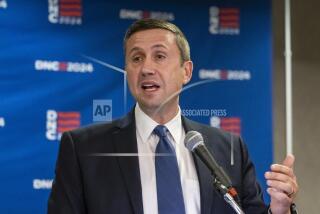Kirk, Ex-Kennedy Aide, New Democratic Chairman
- Share via
WASHINGTON — Paul J. Kirk Jr., former aide to Sen. Edward M. Kennedy (D-Mass.), was elected chairman of the Democratic National Committee on Friday and declared the time has come to end “the soul-searching, . . . the identity crisis of the Democratic Party.”
Kirk, treasurer of the party since 1983, defeated former North Carolina Gov. Terry Sanford in the voting by the 378-member DNC at its annual winter meeting. Sanford was the only remaining challenger after two others dropped out at the last minute to support Sanford.
The vote favoring Kirk was 203.07 to 150.93.
Kirk, who served for eight years on Kennedy’s staff, spoke of the need for the party to recover from the series of overwhelming presidential defeats by the Republicans and to try to reclaim the status as the majority party of the country that it has lost to the surging fortunes of the GOP and President Reagan.
“After suffering four out of five defeats at the national level, a little Democratic candor may be good for our soul,” he told the DNC after winning. “This is not a cheerleading speech. It is a time for sober reflection on where we are and where we are going.”
“Today, the soul-searching has ended. . . . It is the end of the identity crisis of the Democratic Party. And let today mark the day that the Democratic Party goes back to work to reclaim its rightful and legitimate heritage as the party that speaks to the aspirations of the future for all Americans,” he added.
A 1960 graduate of Harvard College and a 1964 graduate of Harvard Law School, Kirk, 46, practiced law in Boston before going to work for Kennedy in 1969. After leaving Kennedy’s staff, Kirk went back to work as a lawyer in Washington and Boston. He was chairman of Kennedy’s 1980 presidential bid.
Supporters of Kirk’s opponents--Sanford, former California state chairman Nancy Pelosi and party professional Robert Keefe--questioned whether Kirk could be independent of Kennedy, particularly as Kennedy is mentioned as a prime contender for the party’s presidential nomination in 1988.
But Kirk overcame those doubts and had strong support from union representatives and from the Northeast as well as surprising strength in the West. Much of Sanford’s support came from the South, where party office-holders had encouraged and backed his candidacy.
Kirk indirectly addressed that criticism as he talked of what the Democrats must do to shed the image of just a diverse group of special interests.
“We must not be perceived--and cannot be in fact--captive of any caucus or candidate or constituency or any narrow ideology or any single region,” Kirk said in his acceptance speech. “If we are any of these, we will not survive as a national party.”
Praises Former Opponents
Kirk praised each of his former opponents, and Sanford in turn declared the “true path of the Democratic Party has to be built on unity. . . . I hope every Democrat here will join hands and support you.”
Kirk pledged to build up the party’s fund-raising machinery, which has lagged far behind the Republicans, and to improve the party’s use of the high-technology tools of politics. The GOP regularly raises and spends four and five times as much as the Democrats’ party committees.
He also promised to set up a policy institute within the party. This forum would be dominated by elected officials and would serve as the arena for publicizing and shaping the party’s ideals.
“Our first priority as a party is to expand our political base by having a national vision and a national message for a national audience,” he said.
Second Heated Contest
In another heated contest, Illinois state controller Roland Burris defeated Gary, Ind., Mayor Richard Hatcher in the race for the vice chairman’s slot.
Hatcher was the choice of the DNC Black Caucus, but the full committee choose Burris.
Incumbent vice chairmen Lynn Cutler of Iowa and Polly Baca of Colorado were re-elected over challenger Alice McDonald, Kentucky superintendent of public instruction.
Dorothy Bush was re-elected as secretary.
Sharon Pratt Dixon of Washington, D.C., won the treasurer’s job without opposition, succeeding Kirk with the new chairman’s backing. Bill Crotty of Florida also sought the job, but withdrew at the last minute.
More to Read
Get the L.A. Times Politics newsletter
Deeply reported insights into legislation, politics and policy from Sacramento, Washington and beyond. In your inbox twice per week.
You may occasionally receive promotional content from the Los Angeles Times.







